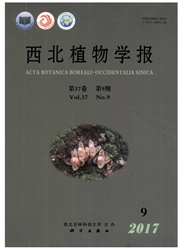

 中文摘要:
中文摘要:
干旱、高盐、高温和低温等非生物胁迫及各种病虫害等生物胁迫严重影响植物的生长发育和作物产量.蛋白激酶主要通过激活不同的磷酸化途径介导外界环境信号的感知和传递,调控下游抗逆基因的转录表达,启动相应的生理生化等适应性反应来降低或消除危害.该文对近年来国内外有关与非生物胁迫和生物胁迫信号传导相关的受体蛋白激酶、促分裂原活化蛋白激酶、钙依赖而钙调素不依赖的蛋白激酶、蔗糖不发酵相关蛋白激酶和其它胁迫相关的植物蛋白激酶的研究进展进行综述,探索蛋白激酶介导的不同磷酸化途径应对逆境胁迫的信号传递网络,为进一步了解植物逆境分子应答机制提供依据.
 英文摘要:
英文摘要:
Abiotic and biotic stresses, including drought, high-salinity, high- and low-temperature, and many diseases seriously affect plant growth and crop yield. Protein kinases mediate the perceiving and transduc- ing of external environment signals via activating diverse phosphorylation pathways, regulate the expres- sion of downstream resistant genes, and trigger multiple physiological and biochemical reactions to mini- mize and eliminate hazards. Based on previous studies, we reviewed the progress in the researches on plant protein kinases,such as receptor-like kinase (RLK),mitogen-activated protein kinase (MAPK), calcium- dependent and calmodulin-independent protein kinase (CDPK) and sucrose non-fermenting-l-related pro- tein kinase (SnRK),which participate in abiotic and biotic stress signal pathways in recent years and ex- plored signal transduction networks of diverse phosphorylation pathways in the responsive reactions. More- over,some emphases in the future study were put forward. This paper provides the basis for deep under- standing the molecular mechanism of plant resistance.
 同期刊论文项目
同期刊论文项目
 同项目期刊论文
同项目期刊论文
 A mutation in Arabidopsis BSK5 encoding a brassinosteroid-signaling kinase protein affects responses
A mutation in Arabidopsis BSK5 encoding a brassinosteroid-signaling kinase protein affects responses Isolation and identification of a wheat gene encoding a zinc finger protein (TaZnFP) responsive to a
Isolation and identification of a wheat gene encoding a zinc finger protein (TaZnFP) responsive to a The Voltage-Dependent Anion Channel 1 (AtVDAC1) Negatively Regulates Plant Cold Responses during Ger
The Voltage-Dependent Anion Channel 1 (AtVDAC1) Negatively Regulates Plant Cold Responses during Ger Overexpression of soybean GmCBL1 enhances abiotic stress tolerance and promotes hypocotyl elongation
Overexpression of soybean GmCBL1 enhances abiotic stress tolerance and promotes hypocotyl elongation A wheat PI4K gene whose product possesses threonine autophophorylation activity confers tolerance to
A wheat PI4K gene whose product possesses threonine autophophorylation activity confers tolerance to Two Wheat Glutathione Peroxidase Genes Whose Products Are Located in Chloroplasts Improve Salt and H
Two Wheat Glutathione Peroxidase Genes Whose Products Are Located in Chloroplasts Improve Salt and H 期刊信息
期刊信息
